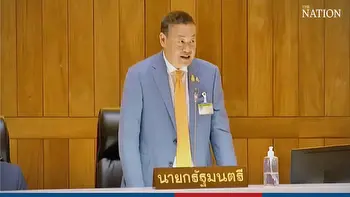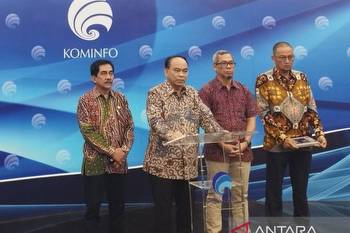DES crackdown aims to close more illegal gambling sites

The Digital Economy and Society (DES) Ministry has vowed to shut down more illegal online gambling sites.
The ministry also wants to focus on building up awareness of digital threats, as well as collaborating with related agencies and telecom operators to pave the way for the government's launch of the digital wallet, said DES Minister Prasert Jantararuangthong.
Mr Prasert said he is proud of his three months at the ministry, especially the operations of the Anti-Online Scam Operation Centre (AOC).
To prepare for the launch of the digital wallet scheme, he said the ministry is setting targets and building up awareness of digital threats to people.
"Amid more sophisticated threats to people, scammers are trying more types of fraud, which should ramp up when the digital wallet scheme launches next May," he said.
The minister detailed many ministry achievements yesterday, including the operations of the AOC, a one-stop service point to tackle rampant online scams, which launched on Nov 1.
The AOC is located at National Telecom's headquarters on Chaeng Watthana Road, while the centre's 24-hour hotline number for the public is 1441.
The centre deploys advanced technologies to integrate related data from organisations to create a large database that it uses to analyse and suppress scams.
The AOC can help with immediate suspension of affected bank accounts as requested by victims, follow up on helping victims, accelerate the process of returning money to victims, and use technology to suppress scams.
Last month the centre froze 7,996 bank accounts and helped arrest 389 suspected fraudsters.
The ministry is also using technology and collaborating with social media platforms to shut down illegal websites, totalling 25,061 websites during Oct 1-Dec 10, up 10 times year-on-year. For the period it closed 4,592 online gambling websites, up 17.5 times.
The ministry sped up the implementation of six measures dealing with leaks of people's personal data and trading of their ID card information.
The Personal Data Protection Commission set up a centre to monitor breaches of personal data. Between Nov 9 and Dec 9, the centre monitored 15,320 private and public organisations and found 4,594 leakage cases, which were all solved.
Another effort focused on suppressing "mule accounts", with the Office of the National Broadcasting and Telecommunications Commission (NBTC) drafting new regulations to require all mobile phone users who have more than five registered active SIM cards to re-register or verify the SIM cards at mobile operators' service centres within 60 days after enforcement to avoid deactivation.
People who fail to do so within the first 30 days following enforcement can receive calls, but not make calls.
The NBTC also sent letters to major telecom operators mandating they examine the prepaid phone numbers of individual users with outgoing calls of more than 100 per day from Dec 9, then suspend the numbers immediately.
The owners of the numbers are required to verify their identities within 15 days in order to restore the service. If they fail to do so, their mobile phone service will be cancelled, said the regulator.
The ministry has also been trying to persuade foreign tech companies to invest more in Thailand. Chinese technology giant Huawei agreed to establish a centre to develop Thai workers in the artificial intelligence (AI) and cloud fields.
The centre aims to produce 50,000 personnel within five years. It is projected to generate income of 60 billion baht for these workers and address the shortage of AI and cloud personnel in Thailand.




































